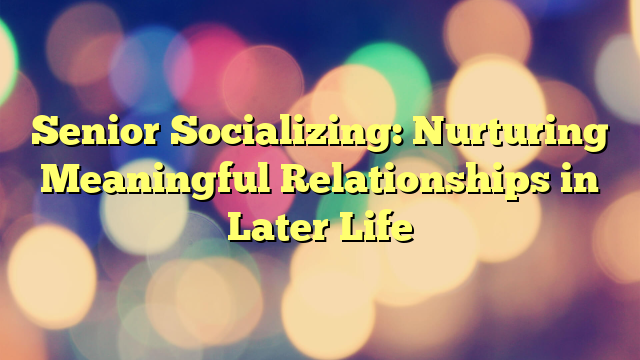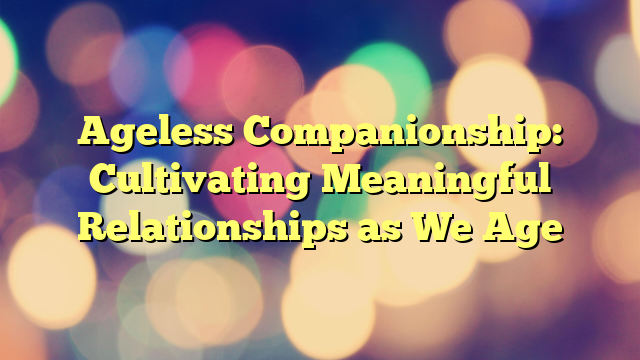Senior Socializing: Nurturing Meaningful Relationships in Later Life

As individuals enter the later stages of their lives, the importance of nurturing meaningful relationships becomes even more crucial. Socializing plays a vital role in promoting mental, emotional, and physical well-being among senior citizens. Engaging in social activities not only provides a sense of belonging but also helps combat loneliness, depression, and cognitive decline. In this article, we will explore the significance of senior socializing and discuss various ways seniors can cultivate and maintain meaningful relationships.
The Importance of Senior Socializing
As people age, their social circles often tend to shrink due to various reasons such as retirement, loss of loved ones, or physical limitations. However, maintaining social connections is essential for seniors to lead fulfilling lives and maintain a positive outlook. Here are some key reasons why senior socializing is crucial:
1. Emotional Well-being
Regular social interactions help seniors combat feelings of loneliness and isolation, which can often lead to depression and anxiety. Meaningful relationships provide emotional support, a sense of purpose, and a feeling of belonging, all of which contribute to overall emotional well-being. When seniors have strong emotional support systems, they are better equipped to handle the challenges and transitions that come with aging.
2. Mental Stimulation
Engaging in social activities stimulates cognitive function and helps seniors stay mentally sharp. Conversations, discussions, and debates with peers stimulate the brain, promoting critical thinking, problem-solving skills, and memory retention. The exchange of ideas and experiences during social interactions fosters intellectual growth and keeps the mind active and engaged. Seniors who regularly engage in stimulating conversations and activities are more likely to maintain their mental acuity and cognitive abilities as they age.
3. Physical Health Benefits
Socializing often involves physical activities such as walking, dancing, or participating in group exercises. Regular physical engagement improves cardiovascular health, enhances balance and coordination, and reduces the risk of chronic diseases. Physical activities also release endorphins, which are known as the “feel-good” hormones, promoting overall well-being and reducing stress levels. Additionally, seniors who have an active social life are more likely to prioritize self-care and maintain healthy lifestyle habits, such as regular exercise, proper nutrition, and sufficient sleep.
4. Preventing Cognitive Decline
Studies suggest that seniors who engage in frequent social interactions have a reduced risk of cognitive decline and dementia. Socializing keeps the mind active, challenges cognitive abilities, and provides opportunities for continuous learning, all of which contribute to maintaining cognitive health. Engaging in conversations and activities that require memory recall, problem-solving, and decision-making can help seniors preserve their cognitive function and delay the onset of age-related cognitive decline. By staying socially active, seniors can stimulate their brain and maintain their mental sharpness.
Strategies for Nurturing Meaningful Relationships
Now that we understand the importance of senior socializing, let’s explore some practical strategies for seniors to cultivate and maintain meaningful relationships:
1. Join Community Groups and Clubs
Local community centers, religious organizations, and senior centers offer a range of social activities and clubs tailored to the interests of older adults. Seniors can join groups such as book clubs, hobby clubs, or volunteer organizations to meet like-minded individuals and build new connections. These groups provide a supportive environment where seniors can bond over shared interests and engage in meaningful conversations, fostering a sense of belonging and camaraderie.
2. Participate in Group Exercise Classes
Exercise classes specifically designed for seniors not only promote physical well-being but also provide an excellent opportunity to socialize. Whether it’s a yoga class, swimming group, or a dance session, participating in group exercises allows seniors to meet new people and foster friendships based on shared interests. These classes often create a sense of community and provide a platform for seniors to encourage and motivate one another, leading to lasting relationships beyond the exercise setting.
3. Attend Social Events and Gatherings
Seniors can make an effort to attend social events, parties, and gatherings organized by their family, friends, or communities. These events provide a relaxed and enjoyable environment to connect with others, share experiences, and create lasting memories. By actively participating in social activities, seniors can expand their social networks and strengthen existing relationships. Attending events regularly also helps seniors stay connected with their loved ones and maintain a sense of belonging within their social circles.
4. Embrace Technology for Social Connections
In today’s digital age, technology offers numerous avenues for seniors to connect with others. Using social media platforms, video calling apps, or joining online communities can help seniors stay connected with loved ones who may be geographically distant. Additionally, there are online forums and virtual interest groups that cater specifically to older adults, providing a platform for making new connections and engaging in discussions. Embracing technology allows seniors to overcome physical barriers and maintain social connections from the comfort of their own homes.
5. Volunteer and Give Back to the Community
Volunteering not only contributes to society but also allows seniors to meet new people who share similar values and interests. Engaging in community service opens doors to meaningful relationships and provides a sense of purpose and fulfillment. By volunteering, seniors can connect with individuals from diverse backgrounds and establish deep connections based on their shared commitment to making a positive impact in their communities. Volunteering also provides seniors with opportunities to learn new skills, gain valuable experiences, and maintain a sense of productivity and fulfillment in their later years.
6. Seek Support from Support Groups
Seniors facing specific challenges such as grief, chronic illness, or caregiving responsibilities can benefit from joining support groups. These groups provide a safe space to share experiences, seek advice, and form connections with individuals who understand their unique circumstances. Support groups offer a network of support and empathy, allowing seniors to find solace, encouragement, and understanding. By participating in support groups, seniors can establish meaningful relationships with individuals who can relate to their experiences and provide valuable emotional support.
7. Maintain Existing Relationships
Nurturing meaningful relationships also involves maintaining the connections that seniors already have. Regularly reaching out to family members, friends, and acquaintances through phone calls, emails, or visits helps ensure that these relationships remain strong and fulfilling. Taking the initiative to stay in touch and actively engaging in conversations and activities with loved ones demonstrates a commitment to maintaining and strengthening these relationships. By investing time and effort into existing connections, seniors can continue to enjoy the benefits of meaningful relationships and create lasting memories together.
8. Engage in Lifelong Learning
Enrolling in courses or workshops on topics of interest not only provides intellectual stimulation but also opens doors to meet new people with shared passions. Learning together fosters a sense of camaraderie and provides opportunities for conversation and connection. Seniors can join classes or workshops related to their hobbies, interests, or personal development goals. By actively engaging in lifelong learning, seniors can expand their knowledge, meet individuals who share their interests, and cultivate meaningful relationships based on a shared love for learning and personal growth.
In conclusion, senior socializing plays a vital role in nurturing meaningful relationships and enhancing the overall well-being of older adults. By actively engaging in social activities, joining groups, attending events, and embracing technology, seniors can combat loneliness, prevent cognitive decline, and enjoy a fulfilling and enriching social life in their later years. Remember, it’s never too late to forge new connections and strengthen existing ones. So, let’s encourage and support seniors in their pursuit of socializing and building meaningful relationships!

